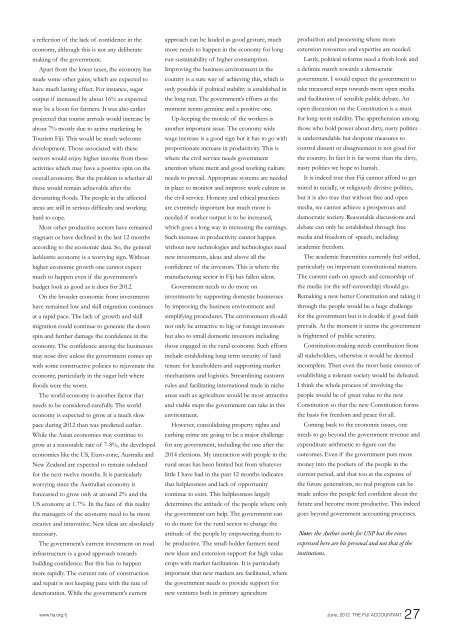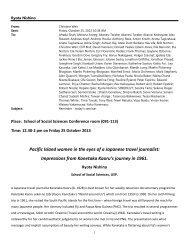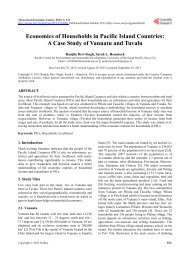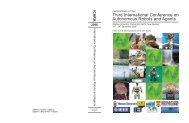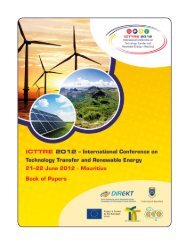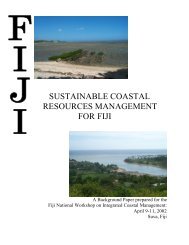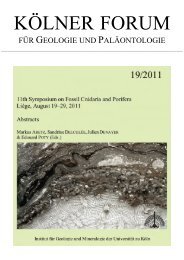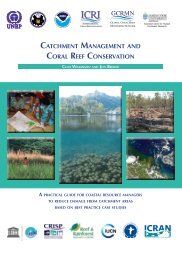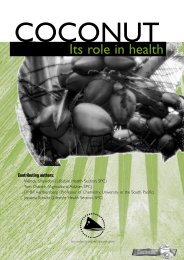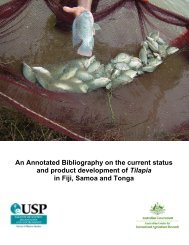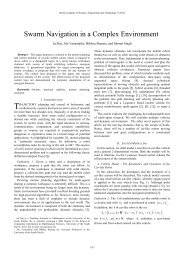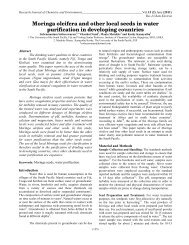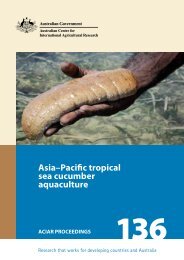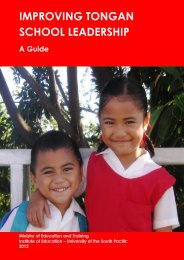Download - Fiji Institute of Accountants
Download - Fiji Institute of Accountants
Download - Fiji Institute of Accountants
You also want an ePaper? Increase the reach of your titles
YUMPU automatically turns print PDFs into web optimized ePapers that Google loves.
a reflection <strong>of</strong> the lack <strong>of</strong> confidence in the<br />
economy, although this is not any deliberate<br />
making <strong>of</strong> the government.<br />
Apart from the lower taxes, the economy has<br />
made some other gains, which are expected to<br />
have much lasting effect. For instance, sugar<br />
output if increased by about 16% as expected<br />
may be a boon for farmers. It was also earlier<br />
projected that tourist arrivals would increase by<br />
about 7% mostly due to active marketing by<br />
Tourism <strong>Fiji</strong>. This would be much welcome<br />
development. Those associated with these<br />
sectors would enjoy higher income from these<br />
activities which may have a positive spin on the<br />
overall economy. But the problem is whether all<br />
these would remain achievable after the<br />
devastating floods. The people in the affected<br />
areas are still in serious difficulty and working<br />
hard to cope.<br />
Most other productive sectors have remained<br />
stagnant or have declined in the last 12 months<br />
according to the economic data. So, the general<br />
lacklustre economy is a worrying sign. Without<br />
higher economic growth one cannot expect<br />
much to happen even if the government’s<br />
budget look as good as it does for 2012.<br />
On the broader economic front investments<br />
have remained low and skill migration continues<br />
at a rapid pace. The lack <strong>of</strong> growth and skill<br />
migration could continue to generate the down<br />
spin and further damage the confidence in the<br />
economy. The confidence among the businesses<br />
may nose dive unless the government comes up<br />
with some constructive policies to rejuvenate the<br />
economy, particularly in the sugar belt where<br />
floods were the worst.<br />
The world economy is another factor that<br />
needs to be considered carefully. The world<br />
economy is expected to grow at a much slow<br />
pace during 2012 than was predicted earlier.<br />
While the Asian economies may continue to<br />
grow at a reasonable rate <strong>of</strong> 7-8%, the developed<br />
economies like the US, Euro-zone, Australia and<br />
New Zealand are expected to remain subdued<br />
for the next twelve months. It is particularly<br />
worrying since the Australian economy is<br />
forecasted to grow only at around 2% and the<br />
US economy at 1.7%. In the face <strong>of</strong> this reality<br />
the managers <strong>of</strong> the economy need to be more<br />
creative and innovative. New ideas are absolutely<br />
necessary.<br />
The government’s current investment on road<br />
infrastructure is a good approach towards<br />
building confidence. But this has to happen<br />
more rapidly. The current rate <strong>of</strong> construction<br />
and repair is not keeping pace with the rate <strong>of</strong><br />
deterioration. While the government’s current<br />
approach can be lauded as good gesture, much<br />
more needs to happen in the economy for long<br />
run sustainability <strong>of</strong> higher consumption.<br />
Improving the business environment in the<br />
country is a sure way <strong>of</strong> achieving this, which is<br />
only possible if political stability is established in<br />
the long run. The government’s efforts at the<br />
moment seems genuine and a positive one.<br />
Up-keeping the morale <strong>of</strong> the workers is<br />
another important issue. The economy wide<br />
wage increase is a good sign but it has to go with<br />
proportionate increase in productivity. This is<br />
where the civil service needs government<br />
attention where merit and good working culture<br />
needs to prevail. Appropriate systems are needed<br />
in place to monitor and improve work culture in<br />
the civil service. Honesty and ethical practices<br />
are extremely important but much more is<br />
needed if worker output is to be increased,<br />
which goes a long way in increasing the earnings.<br />
Such increase in productivity cannot happen<br />
without new technologies and technologies need<br />
new investments, ideas and above all the<br />
confidence <strong>of</strong> the investors. This is where the<br />
manufacturing sector in <strong>Fiji</strong> has fallen silent.<br />
Government needs to do more on<br />
investments by supporting domestic businesses<br />
by improving the business environment and<br />
simplifying procedures. The environment should<br />
not only be attractive to big or foreign investors<br />
but also to small domestic investors including<br />
those engaged in the rural economy. Such efforts<br />
include establishing long term security <strong>of</strong> land<br />
tenure for leaseholders and supporting market<br />
mechanisms and logistics. Streamlining customs<br />
rules and facilitating international trade in niche<br />
areas such as agriculture would be most attractive<br />
and viable steps the government can take in this<br />
environment.<br />
However, consolidating property rights and<br />
curbing crime are going to be a major challenge<br />
for any government, including the one after the<br />
2014 elections. My interaction with people in the<br />
rural areas has been limited but from whatever<br />
little I have had in the past 12 months indicates<br />
that helplessness and lack <strong>of</strong> opportunity<br />
continue to exist. This helplessness largely<br />
determines the attitude <strong>of</strong> the people where only<br />
the government can help. The government can<br />
to do more for the rural sector to change the<br />
attitude <strong>of</strong> the people by empowering them to<br />
be productive. The small-holder farmers need<br />
new ideas and extension support for high value<br />
crops with market facilitation. It is particularly<br />
important that new markets are facilitated, where<br />
the government needs to provide support for<br />
new ventures both in primary agriculture<br />
production and processing where more<br />
extension resources and expertise are needed.<br />
Lastly, political reforms need a fresh look and<br />
a definite march towards a democratic<br />
government. I would expect the government to<br />
take measured steps towards more open media<br />
and facilitation <strong>of</strong> sensible public debate. An<br />
open discussion on the Constitution is a must<br />
for long-term stability. The apprehension among<br />
those who hold power about dirty, nasty politics<br />
is understandable but despotic measures to<br />
control dissent or disagreement is not good for<br />
the country. In fact it is far worse than the dirty,<br />
nasty politics we hope to banish.<br />
It is indeed true that <strong>Fiji</strong> cannot afford to get<br />
mired in racially, or religiously divisive politics,<br />
but it is also true that without free and open<br />
media, we cannot achieve a prosperous and<br />
democratic society. Reasonable discussions and<br />
debate can only be established through free<br />
media and freedom <strong>of</strong> speech, including<br />
academic freedom.<br />
The academic fraternities currently feel stifled,<br />
particularly on important constitutional matters.<br />
The current curb on speech and censorship <strong>of</strong><br />
the media (or the self-censorship) should go.<br />
Remaking a new better Constitution and taking it<br />
through the people would be a huge challenge<br />
for the government but it is doable if good faith<br />
prevails. At the moment it seems the government<br />
is frightened <strong>of</strong> public scrutiny.<br />
Constitution-making needs contribution from<br />
all stakeholders, otherwise it would be deemed<br />
incomplete. Then even the most basic essence <strong>of</strong><br />
establishing a tolerant society would be defeated.<br />
I think the whole process <strong>of</strong> involving the<br />
people would be <strong>of</strong> great value to the new<br />
Constitution so that the new Constitution forms<br />
the basis for freedom and peace for all.<br />
Coming back to the economic issues, one<br />
needs to go beyond the government revenue and<br />
expenditure arithmetic to figure out the<br />
outcomes. Even if the government puts more<br />
money into the pockets <strong>of</strong> the people in the<br />
current period, and that too at the expense <strong>of</strong><br />
the future generations, no real progress can be<br />
made unless the people feel confident about the<br />
future and become more productive. This indeed<br />
goes beyond government accounting processes.<br />
Note: the Author works for USP but the views<br />
expressed here are his personal and not that <strong>of</strong> the<br />
institutions.<br />
www.fia.org.fj June, 2012. The FiJi AccounTAnT 27


